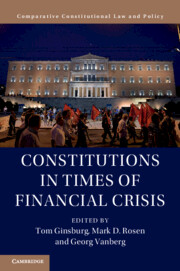Book contents
- Constitutions in Times of Financial Crisis
- Constitutions in Times of Financial Crisis
- Copyright page
- Contents
- Contributors
- Foreword
- I The Role of Constitutions in Dealing with Crises
- II Courts and Crises
- III Supranational Governance and Crisis
- IV Implementing Austerity
- V The Effect of Crises on Constitutions
- Index
IV - Implementing Austerity
Published online by Cambridge University Press: 08 June 2019
- Constitutions in Times of Financial Crisis
- Constitutions in Times of Financial Crisis
- Copyright page
- Contents
- Contributors
- Foreword
- I The Role of Constitutions in Dealing with Crises
- II Courts and Crises
- III Supranational Governance and Crisis
- IV Implementing Austerity
- V The Effect of Crises on Constitutions
- Index
Summary
The aim of this chapter is to analyze how a specific constitutional regime dealt with an impending financial emergency. To assess the constitution’s constraining effects on the legislator’s margin of choice within an economic crisis, we will focus on the Portuguese constitutional case law that has reviewed austerity measures.1 For this purpose, we define “austerity legislation” as law that was adopted to cope with budgetary deficit reduction following the great recession and that affects individual rights and freedoms.2
We begin by briefly describing the domestic and international events that lead to the adoption of several packages of austerity and the formal financial rescue program. In section III, we go through the crisis constitutional case law. The Portuguese Constitutional Court (CC) has dealt with financial emergencies since its early days. After reviewing that initial jurisprudence, we analyze the case law on austerity which comprises not only legislation enacted before the bailout, but also the policies required by the formal program.
- Type
- Chapter
- Information
- Constitutions in Times of Financial Crisis , pp. 227 - 282Publisher: Cambridge University PressPrint publication year: 2019

